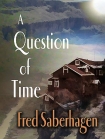A Question Of Time by Fred Saberhagen (best electronic book reader TXT) 📗

- Author: Fred Saberhagen
Book online «A Question Of Time by Fred Saberhagen (best electronic book reader TXT) 📗». Author Fred Saberhagen
“It’s Beagle,” breathed Cathy in an awed voice.
“Beagle?”
“That’s his name. He was my own pet kitten once. Or a cat that I remember as looking just like that one. My father got it for me. I remember wanting a kitten, and wanting one so much, and I think I remember telling my father … a cat can live twelve years, can’t it?”
“Sure. I think so.”
When the visitors reached the door of the cottage, Cathy tried the latch and found it open. There was no other lock. She started to go in.
Maria took a step back. “Are you sure this is all right?”
“Of course it is. I live here.”
“But you don’t any more.” Maria raised her hands, rubbed her eyes, shook her head, and looked about her. “What am I doing here? Where are we, anyway?”
But Cathy had already disappeared into the darkness inside the little house.
* * *
There were electric lights, in the main room at least, and Cathy knew where to find the switch.
“Just like I remember it,” she murmured, looking around the large room. “Except that everything’s so small. I seem to remember even the furniture. This chair—” She dragged a hand across the rough-carved wooden back.
Maria was looking out one of the windows into gathering dusk. She said: “Someone’s coming.”
Cathy turned. The man, dressed in dusty workman’s clothes and looking calmly angry, was already standing in the door. His was the righteous look of a homeowner confronting unexpected intruders.
“Father?” The word burst from Cathy at once, impulsively. “Then you are still alive!”
The man’s face was changed, scarred and darkened, from the face that she remembered. But in her mind there could be no doubt.
The man in the doorway froze into position for a long moment. Then he glanced briefly at Maria, before fastening a penetrating gaze on Cathy. His face now betrayed little or nothing of whatever he might be feeling.
He asked, in a rasping voice: “Who are you?”
It was as if Cathy did not even hear the question. She stood where she was, her hands on the back of one of the wooden chairs, gazing back at him. “Daddy?”
“My God—is it possible?” Still staring at her, the man stepped forward, groping for the nearest chair. When he had it in hand he pulled it to him and sat down. His sitting was a sudden movement, as if his knees were no longer to be trusted.
He said, slowly: “What do you call me?”
“You are my father, aren’t you? You must be. I can remember you—and I remember this house.” She looked around her. She looked back at him. “I lived here, once.”
“What’s your name, girl?” It was an old, old voice.
“I’m Cathy. Don’t you know me? I can remember you as if it were yesterday. You haven’t changed—not much.”
“Cathy. For a moment I thought that you were young Sarah, somehow finding her way back to me. It’s a wonder—a marvel—how much you resemble your mother.”
At once, as if the question could be held back no longer, the girl demanded: “Why did you desert me and my mother?”
“Desert you? I?”
“She left me in an orphanage, when I was four or five years old. That much I know. She wouldn’t have had to do that, if you hadn’t deserted her. Am I mistaken?” Cathy seemed anxious to be told that she was.
Edgar Tyrrell drew himself up straight in his chair. “I deserted her? And abandoned you? Who told you that?”
“It seems obvious. Am I mistaken? I can remember the two of you quarreling. Up on the rim, the day—someone—was being buried.”
The man in the chair looked old. After a moment he said: “Your sister was buried up there. I’m surprised you can remember that.” He shook his head slowly. “After that, your mother walked out on me. She blamed me, somehow. She took you with her and walked out on me one bright day, without warning. And she never came back.”
After a pause Cathy asked: “What was she like? My mother?”
“In her youth, you mean? You speak of her—in the past tense.”
Cathy stared at him. “She’s dead!”
Old Tyrrell stared back. Then he looked about the room, remembered something, and in an instant was on his feet, in a fluid movement that belied his look of age.
“Where is your companion?” he demanded sharply.
Cathy needed a moment to understand. “Maria? I don’t know. She was right here a moment ago.”
Tyrrell stood listening, in concentration. “It doesn’t matter,” he said at last. “She will not have got far. She doesn’t matter.” His gaze fixed on Cathy again. “You matter, though.”
“Father?” Cathy, letting go of her chair, came toward him, at first tentatively, then in a little rush that ended in an awkward embrace. Tyrrell’s arms, at first raised as if to ward her off, closed about her slowly, gently.
“You are my father,” she said against his shoulder.
Gently and slowly he disengaged to hold her at arm’s length.
“I am—I was—your stepfather, child. When I first saw you, you were perhaps two years old. Your sister was a babe in arms. Your mother was—or is—the only woman—perhaps the only person—I have ever truly loved. You—and your sister—were the only children I could ever have. Therefore you matter to me. And you always will.”
He added gently, “You told me just now that your mother was dead?”
“My real mother? She’s been dead since I was six.” Cathy paused, suspicion being born. “Hasn’t she?”
Tyrrell ignored that question for the moment. “When did you leave the Rim, in what year? And how did you get here, into the Deep Canyon? The way should not be open.”
“The way was open for me,” Cathy said simply. “Because I lived here once, I remembered how to find the turning. I came looking for you.”
“What year? Tell me, what year?”
“I don’t know what you mean. This year. This year is nineteen ninety-one.”
“Ah,” the man said.
Moving past him to the open door, looking out into the gathering night, the young woman sampled the air, the strangeness of the place,





Comments (0)